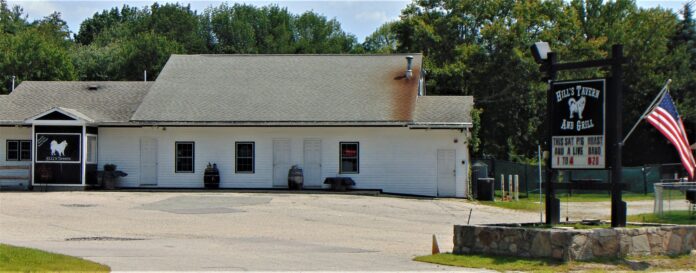GLOCESTER – After the owner admitted to three violations, Hill’s Tavern & Grill will retain its liquor license, but not without consequences.
The Glocester Town Council, acting in its official capacity as the Glocester Licensing Board, ordered the bar and restaurant to close its doors for one day on Thursday, Nov. 2, and pay $200 in fines.
At a special hearing held on Thursday, Oct. 19, David D’Agostino, the lawyer representing Hill’s Tavern, located at 417 Putnam Pike, said his client Albert Hill, Jr., proprietor of Hill’s Tavern, was not contesting the charges. The charges included failing to have proper liability insurance as required by Rhode Island State law, failure to have a sign-in-as-minor book as required for regulation of sales and failure to have proper server training certificates on the premises or filed with the licensing authority for an on duty bartender on June 19.
“There’s very little disagreement with the facts of this case,” admitted D’Agostino. “However, where we do have disagreements, there are a couple of critical things the council needs to be aware of.”

D’Agostino said there was a misunderstanding leading to the charge of failing to have proper liability insurance as required. Though Hill had received notices in May from the insurance companies that his policy was due to expire, Hill was under the assumption that he was covered, having sent in checks to cover the insurance. He said he had not received any official notices of cancellation at that point. D’Agostino pointed out refund checks from two insurance companies with whom Hill’s was insured, explaining that apparently there had been some mix up in the payments by the companies involved, leading to the refunds. Hill was notified by town officials on Friday, June 16, that they had been informed that liability insurance had lapsed, which is required by law in order to maintain a liquor license. He was told he could no longer serve alcohol until that issue was resolved. He said he immediately sent a certified check to the insurance company, assuming that the problem was solved, and that he could continue to operate as usual, serving alcohol. However, the payment wasn’t posted until the next business day, June 20. The official certificate was issued on June 22.
“Mr. Hill has maintained right along that if there was an issue with payment, he didn’t understand what the issue with payment was,” D’Agostino told the council. “I think that is borne out by the fact that on July 26 he got a refund from the company who allegedly notified him that he hadn’t paid. It’s just not a case of disregarding these alleged notices.”
He added what subsequently happened was a result of a misunderstanding.
“We are pretty much acknowledging that there were three violations that occurred,” said D’Agostino. “There are some mitigating factors having to do with Mr. Hill’s belief that he had paid the policy and didn’t understand why they were saying it was cancelled. I don’t want anyone here to think that Mr. Hill is regarding this matter lightly in any way.”
When police entered the premises on June 19, they discovered the violations, and charges were levied since no license had been officially certified.
“There is a fair amount of gray area here,” said Council Vice President Stephen Arnold.
But, he added that as a business owner himself, had he received any letters from the insurance company regarding this matter, he would immediately pick up the phone and resolve it. He pointed out that there was evidence that emails and other correspondence had been sent months prior to the incident from the insurance company notifying Hill of the impending cancellation. He added that the council had received a 13 item addendum from the insurance company regarding those notifications. There was a bigger problem, however.
“We can put all this gray area away,” said Arnold. “Clearly there are a whole lot of facts that are mutually agreed upon. When you are told not to serve alcohol by the town in plain English, and within 48 hours there is alcohol being served, even if an insurance check was submitted, I have a real hard time with that. I got to tell you, I don’t think under normal operating conditions, if we thought we were really free and clear we’d be serving alcohol in red solo cups.”
When asked about the red solo cups, Hill said his glass washer machine was not working, nor was the ice machine, and he had resorted to the cups because of that. He said they had subsequently been repaired. When questioned about the events of June 19, however, Glocester Police Captain Matthew Fague, the officer on duty at that time, explained that patrons were drinking in solo cups with ice in them, and Hill told him that he was aware that he shouldn’t be serving alcohol. Fague added that using the cups was indicative of trying to bypass what he should not have been doing.
More importantly, Arnold said, operating without liability insurance could put the town in a difficult position if a customer of Hill’s had left the establishment and been involved in an accident.
“God forbid, someone pulled out after being overserved with no permission to be served in the first place and something happened on Route 44, and what that would have looked like for liability,” said Arnold. “That’s the one I am having a really hard time with.”
He said the council was rooting for every business in town to be successful and is, “pro business, for sure, especially an establishment our community enjoys.”
But, said Arnold, the fact that a direct order was ignored was too much.
“It felt very disrespectful,” he said.

“I’m disappointed,” said Councilor Walter Steere. “We all want business in town to do well, right? We try to work with them, but this is serious, and I know Mr. Hill understands that. It puts the town in jeopardy. It puts Mr. Hill in jeopardy. That’s the one thing in all of this I am having a problem with – because he was told not to do it.”
“Mr. Hill reasonably believed that by Monday, the 19th, he had the requisite coverage in place,” argued D’Agostino.
Town Solicitor David Igliozzi explained to the council that they had three options. They could suspend Hill’s business for a period of time, or fine him as much as $500 for each offense or a combination of both. Councilor Cheryl Greathouse suggested a $500 fine for each offense, to which Councilor Jonathan Burlingame agreed. Councilors Steere and Arnold disagreed, saying that was too little, given the nature of the first offense of serving alcohol without a license and disregarding the order not to serve alcohol.
Igliozzi said that revoking the license was not an option since it was the first offense.
“I think more than a fine for violation one is appropriate,” said Arnold. “I tremble to think what would have happened if there had been an accident. We have operators in this town with liquor licenses, and we never see them in here.”
Hill told the council that he was embarrassed and that he had apologized to town officials, and was now apologizing to the council.
“I was so upset because I put everyone in this situation,” he told the council.
After more discussion the council agreed to a one day suspension on Thursday, Nov. 2, on a motion proposed by Steere with a 3-1 vote, with Greathouse opposed. Town Council President William Worthy recused himself from the hearing, saying he previously worked at Hill’s. Steere suggested the following Thursday, Oct. 26, but Hill pleaded with the council not to use that day because a major event involving a comedy show was scheduled. Steere relented and changed the date. The council voted unanimously for $100 fines each for violations two and three.







